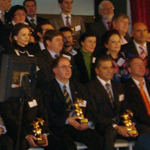
Organizers of various projects supported under the framework of the “Europe for Citizens” Programme met in Brussels on 13-14 November 2008 for the conference entitled “Participation for making a difference” to discuss experiences and future priorities of the programme. They also honoured twelve winning projects with Golden Stars Awards. During the opening ceremony Commissioner Jan Figel emphasized that “integration is not absorption, is not assimilation. It means first and foremost participation as equals in rights and contributions. We are united in diversity.” Three parallel workshops dealt with questions of the development of civic participation in the European Union throughout the last twenty years; the role of civil society in the elections to the European parliament; and the chances for democratic innovation by participation.
EU officials present already displayed a certain self-critical stance – Odile Quintin, Director-General of the Education and Culture DG, remarked that what she called the activities of “civil society apparatschiks” could never replace substantial involvement of “normal” citizens. Workshop participants went on better and did not shy away from speaking up on crucials matters. They voiced their concerns that all too often the Union’s representatives only ask people what they want to know from them, but forget to inquire what people are genuinely interested in. Dr. Stephen D. Smith (Holocaust Centre Beth Shalom) put it in a nutshell:
“We need to talk to people, not to communicate to citizens!”
Dr. Wolf Schmidt (Eustory) later expressed in the plenary what could be read from many faces after the discussions: “Please enjoy more conflict!” Gert Röhrborn, who attended the conference as co-director of the OpenFora programme, was asked to give a brief testimony in the plenary on what “Active European Citizenship” is and how Citizens of Europe exercises it.
Citizens tries to implement its interdisciplinary approach which combines debate, practical training and engaged art to offer participants a space for contributions that really matter for the outcome of a joint action. He described the mental and cultural change needed for it as a permanent process of overcoming. If we want to welcome people to contribute and come as they are, we need to overcome various profound socio-cultural impedements, such as institutionalism as the patron of the idea of Europe or the ideological opposition between europhorics and eurosceptics, and foster a culture of self-representation of people. The much proclaimed European unity never existed – the only joint feature of European histories were recurring claims to power.
Röhrborn made a case for using citizenship in Europe to break this vicious cycle. He expressed his hopes that in its various forms it may help to create a community in Europe which is united by freedom and diversity and welcomes everyone present. Watch a report on the conference on Europarltv.
